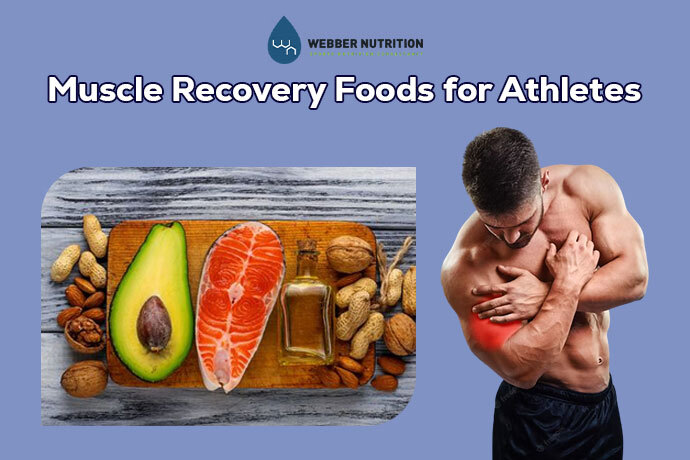Did you know that the foods you eat after a workout can be just as important as the workout itself? This article will discuss muscle recovery foods to stay fit and healthy for optimal performance.
After a long, intense training session your body has been stressed so much that muscles are damaged and your energy stores (muscle glycogen) are depleted.
Muscle recovery foods for post-workout are needed to speed up recovery. You also face other problems like dehydration after working out. A post-workout meal is just as important as a pre-workout meal.
As a post-workout meal, it is advised to prioritise the foods best for muscle recovery.Before you start to wonder which foods are best for muscle recovery? Take note of the 4 R’s of the recovery strategy to optimise your post-workout recovery.
4 R’s for Optimal Post-Workout Recovery
Repair
To heal damaged muscle tissue and promote training adaptations, protein is required
Replenish
To replace lost muscle and replenish liver glycogen, carbohydrates are required ( food for muscle recovery )
Rehydrate
To replace body water and electrolytes lost through sweat, fluids are required
Rest
To promote emotional well-being and healthy brain function, sleep or another form of rest is needed
Post-Workout Recovery: Best Muscle Repair and Recovery Foods
With this in mind, here’s a list of functional foods to consume post-exercise for optimal muscle recovery, allowing your body to repeatedly train and improve performance by maintaining a high-intensity for longer.
Milk
The ultimate post-training recovery drink! Research shows that consuming milk after endurance or resistance exercise is more effective for replenishing glycogen stores, stimulating muscle protein synthesis and rehydration than any commercially available sports supplement.
Milk is also rich in calcium to promote bone health. Milk is a great option for anybody looking to increase muscle mass, as mentioned in the ‘How to stock your muscle building kitchen’ article.
It may also be a better option than carbohydrate drinks for dieters as it offers a greater feeling of satiety, likely attributable to its protein content.
If you are focusing on fat loss then opt for semi-skimmed or skimmed milk for reduced calories. Otherwise whole milk is recommended for enhanced nutrient availability as the fat promotes the absorption and transport of fat-soluble vitamins and minerals.
A pint of whole milk is a cheap and highly beneficial source of nutrients to maximise muscle recovery after any exhaustive exercise.
If you’re lactose intolerant then choose a Lactofree or soy based milk, or if you do not like plain milk then a flavoured product is a good alternative, especially after a competitive game or race.
If you don’t want to drink milk at all, you should prioritise the other recommended top muscle recovery foods and supplements below.
My top 3 recommended flavoured milk recovery drinks:
- Enhanced Recovery Omega-3 Sports Drink – Not only does it provide 20g high quality protein, but includes a whopping 1600mg omega-3, L-Carnitine, vitamins D & E, and is also informed-sport certified for competitive athletes.
- Grenade Carb Killa protein shakes – If you like the Grenade Carb Killa Protein bars then you know you’re in for a treat. These protein shakes taste so good and contain 25g high-quality protein. Perfect when served ice cold after on a hot summer’s day! Get 20% discount code – 20NX on Carbs & protein recovery.
- UFIT 22g protein milkshake – You’ve probably seen these in supermarkets, so pick one up next time and bookmark this link to buy a box of them!
Potatoes
High-glycaemic index (GI) carbohydrates are considered superior to low-GI carbohydrates as post-exercise muscle recovery foods based on their ability to rapidly break it down into sugar and store it as glycogen.
However this theory is aligned to individuals (particularly athletes) who train multiple times per day with short recovery periods between sessions.
White potatoes are considered high-GI whereas sweet potatoes have a low-GI.
If training sessions are more than 24 hours apart then the type of potato may not influence subsequent performance, but if they are as short as 3 hours apart then choose white potatoes for increased carbohydrate availability in the second session.
Aside from carbohydrate content, white potato is higher in folate, iron, potassium, magnesium and sweet potato contains more vitamin A & C and calcium.
Liver
If you believe in the term ‘superfood’ then liver is definitely one of them. This was also mentioned in great detail in the ‘How to stock your muscle building kitchen’ article, outlining how nutrient dense liver is and may actually be a better option than other red meat.
As well as being rich in protein and low in fat, including liver twice per week will significantly boost micronutrient availability to maximise muscle recovery and various physiological functions that are pivotal for performance.
Oily fish
Salmon, mackerel, trout and sardines are all types of oily fish that are rich in omega-3 fatty acids and can be used as muscle recovery foods.
Dietary fat is important for aiding transport of vitamins A, D, E & K, but omega-3 also plays a vital role in reducing inflammation, boosting immune function, stimulating protein synthesis, supporting brain function and cardiovascular health.
Regular intake of oily fish (2-4 servings per week) is recommended to supply sufficient omega-3, but if you do not eat fish then a daily supplement (1-3g) that is rich in EPA & DHA is recommended.
Fruit – pineapple, cherries, bananas
Fruit is rich in vitamins and antioxidants which are vital to recovering from an intense workout. So, what is the best fruit to eat after workout?
A variety of fruit is better than just having one particular favourite to make sure you benefit from all nutrients.
Mixed berries, particularly cherries, are rich in antioxidants and are proven to reduce recovery time following exercise.
A regular intake of colourful berries can boost immune function and protect against exercise induced muscle damage.
Bananas are a very common fruit to be eaten around training because of their high carbohydrate content (25g per banana) made up of glucose and fructose, but also a source of potassium and vitamin B6 for muscle contraction and energy production, respectively.
Pineapple has a high-GI and is rich in vitamin C for immune function, manganese and copper to restore energy levels.
It also contains bromelain; an enzyme that promotes digestive health and reduces inflammation. Enjoy pineapple with some Greek yoghurt as a nutritious snack.
Spinach
Spinach can benefit muscle recovery due to its high antioxidant content, which helps reduce inflammation and promotes better muscle recovery after workouts. It is also rich in potassium and magnesium, essential electrolytes that the body needs to recover and maintain healthy potassium levels, helping to promote muscle function.
Spinach contains nitrates linked to improved muscle function, particularly in the lower limbs. While spinach can aid in muscle recovery and overall physical process, consuming sufficient protein for muscle building and strength is essential. Spinach’s anti-inflammatory effects may enable competitive athletes to resume training more quickly.
A simple serving of spinach can provide enough nitrates for the day, based on calculations from the World Health Organization (WHO). Combining spinach with other muscle recovery foods, including protein, healthy fats, and quality carbs, is essential for the best results.
Best Supplements for Muscle Recovery (Protein)
Food may not always be available so that’s why supplements are so convenient.
Lean meat, fish, eggs, and dairy are excellent options as they are rich in essential amino acids to promote muscle recovery. When food is not available, protein supplements e.g., whey protein are a good alternative post-workout recovery drink to stimulate protein synthesis.
Whey protein is the most effective protein supplement which promotes muscle repair, but if you’re lactose intolerant or vegan, soy or pea protein would be your best choice.
Furthermore, athletes who struggle to get enough protein in their diet through food alone can rely on a whey protein supplement to hit their daily protein needs to boost recovery.
Aside from it’s main role in muscle recovery, protein also supports immune function, so consuming enough each day is important to maintain good health and recovery from exercise, particularly in cold weather!
Also, Learn more about Should I take protein supplements
My top 3 recommended Protein supplements:
- Nutrition X’s Big Whey – It’s Informed-Sport certified to protect athletes against inadvertent doping by going through a rigorous batch testing protocol. They also mix perfectly and taste amazing! Get 20% discount using code 20NX.
- Optimum Nutrition Gold Standard Whey – Batch tested and used by many high performance athletes and a top selling brand.
- Nutrition X’s Pea Protein – Award winning, batch tested, and 28g protein per serving. Ideal protein for vegan athletes! Get 20% discount using code 20NX.
Foods to avoid for better muscle recovery
Highly processed foods with minimal nutritional quality, such as processed sandwich meats, baked goods, low fibre carbohydrate foods like white bread, vegetable oil containing foods like mayonnaise.
All of these foods are pro-inflammatory causing excessive damage to the muscles.
Consuming too many of these and not enough natural foods providing essential vitamins, minerals, fibre, and high-quality proteins creates an imbalance in supporting muscle recovery.
When to consume the best muscle repair foods?
- Maximise recovery by consuming the required protein, carbohydrates and fluids after training so you’re ready for your next session.
- Milk is potentially the best all-in-one option in the initial stages of recovery (<60 mins) as it is a natural source of protein, carbohydrates and electrolytes. Drinks are generally preferred after exercise as they are more palatable and help to rehydrate.
- Carbohydrates and glycaemic index are dependent on when your next training session is – focus on high-GI carbohydrates if training within quick succession (approx. 3 hours), and low-GI carbohydrates are suitable if longer than 24 hours.
- Choose a protein source that is nutrient rich to support a range of physiological functions e.g. liver, lean meats, oily fish.
- Eat a range of fruit to benefit from a range of nutrients including vitamins, antioxidants and anti-inflammatories to keep you healthy and performing at your maximum.
- Food first, supplement later.
Also Learn about Food That Gives You Energy and Stamina.
Nondietary tips to relieve sore muscles
Here are some scientifically proven ways to promote muscle recovery:
Get plenty of sleep:
Research shows the lack of sleep can hinder your performance and muscle recovery.
Compression Therapy:
Compression therapy may help to improve the strength of the treated muscles. It also helps to boost muscle recovery after the exercise.
Thermal Therapy:
It ultimately helps to decrease DOMS, reduce inflammation and muscle recovery.
Foam rolling:
It helps to improve exercise performance and also helps to reduce post-exercise pain.
Massage therapy
Most of the research and studies suggest that massage therapy helps to reduce DOMS and improve muscle performance.
Also learn about what to eat before a 10k race.
In Conclusion:
Including the right foods in your post-workout routine can significantly enhance muscle recovery for athletes. These top muscle recovery foods help repair muscle damage, reduce inflammation, and replenish energy stores by providing essential nutrients, antioxidants, and anti-inflammatory properties. The choices are diverse and delicious, from protein-rich options like lean meats and legumes to nutrient-dense fruits, vegetables, and whole grains. Proper nutrition is vital to optimizing athletic performance and achieving your fitness goals. So, fuel your body with these muscle recovery foods to ensure a speedy and effective post-workout recovery, enabling you to perform at your best and excel in your athletic pursuits.
If you are looking for consultation on nutrition, you can contact us today!






